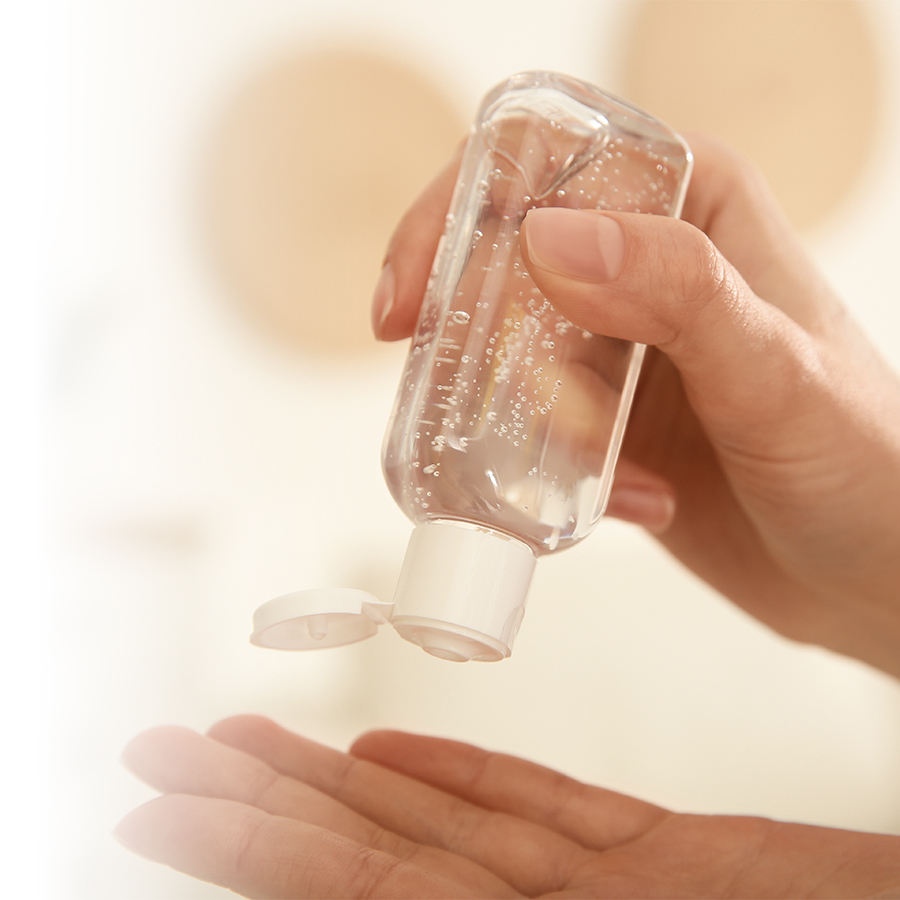In an age where the war on germs is omnipresent, the use of hand sanitizer is common. Is this a good option?
Hand hygiene and disease prevention
You put your hands on your face countless times each day. The hands are virtual germ-carriers, such as viruses and bacteria. In fact, germ contamination often involves the hands. For instance, contact with a contaminated object or a handshake can allow germs to enter your body unbeknownst to you. This is why proper hand hygiene is key.
Hand hygiene includes certain measures, including washing with soap and water, and disinfecting with antiseptic gels, (or hand sanitizers). These two measures are excellent ways to avoid being contaminated or contaminating others. These simple and effective measures will help to protect your health. Moreover, they are currently recommended at large in the general public through infection control programs.
Distinguishing between true and false
As is often the case in the area of health, hand sanitizers were the subject of controversy. Here are 10 examples of assertions that merit clarification.
1. The use of a hand sanitizer replaces handwashing with soap and water.
Answer: false. Many people mistakenly believe that the use of a hand sanitizer decreases the importance of handwashing with soap and water. Nothing could be further from the truth! Hand sanitizers are not cleansers; they do not remove dirt, visible or not. Only effective handwashing ensures a thorough cleaning. The use of a hand sanitizer should be viewed as complementary to handwashing, which is part of comprehensive approach to hygiene and infection control. That being said, sometimes, if access to soap and water is not possible, the use of a hand sanitizer can be beneficial.
2. All antiseptic gels eliminate 99% of germs.
Answer: false. The effectiveness of hand sanitizers may differ depending on the product. However, it is fair to say that several of them eliminate more than 99% of germs likely to cause common respiratory infections, such as a cold or the flu. The use of antiseptic gels prevents hand contamination, but does not inevitably prevent viral or bacterial infections which enter the body via other pathways.
3. The higher the alcohol content, the more effective the hand sanitizer.
Answer: true and false. In order to exercise their disinfectant action, hand sanifizers must consist of a certain concentration (between 60 and 80%) of water and alcohol (ethylic or isopropylic). In lower or higher concentrations, antiseptic activity is reduced. Read the manufacturer's label carefully to obtain the alcohol content of the product.
4. Hand sanitizers cause the appearance of superbugs.
Answer: false. As mentioned earlier, the active ingredient in hand sanitizers is alcohol, which has the advantage of acting and evaporating quickly. Once it has evaporated, it leaves no residue. There is no current scientific data available which indicates that the use of alcohol-based gels are likely to cause certain germs to become resistant to their action.
5. Hand sanitizers tend to dry out the skin more than soap.
Answer: true and false. Hand sanitizers dry out skin more due to the alcohol they contain. This is why some manufacturers sometimes add an emollient or moisturizer to these products. Furthermore, some added ingredients, such as fragrances for instance, can irritate the skin. It is important to specify that repeated handwashing with soap and water can also cause dryness and irritation. Of course, these effects depend partly on the soap that is used.
6. Poisoning risks are associated with the use of hand sanitizers.
Answer: true. A number of poisonings related to the use of hand sanitizers are reported in Canada each year. These cases sometimes occur following accidental ingestion, particularly in babies and young children. This is partly explained by easy access to the products and their sometimes appealing fragrance. Ingestion of antiseptic gels can also be intentional because of the alcohol they contain. Therefore, there is a real risk of alcohol poisoning, whether it is voluntary or not.
7. Drying or washing your hands after using a hand sanitizer renders it ineffective.
Answer: true. After applying a hand sanitizer, it is important not to rinse or wash hands or to wipe them on a towel, which will reduce the product's effectiveness. Instead, hands should be rubbed together until they become dry (the alcohol will evaporate). Additionally, hands should not be wet when the hand sanitizer is applied, as this could also compromise the product's optimal action.
8. All hand sanitizers contain triclosan, a harmful chemical compound for health.
Answer: false. Triclosan is a preservative used to make certain consumer goods (cosmetics, cleansers, toothpaste, mouthwash, etc.). It prevents or slows the proliferation of germs and prevents the deterioration of products. Health Canada has set standards for the use of triclosan in commercial products, by imposing maximum amounts, among other things, that are much lower than those that could be harmful to health. That being said, hand sanitizers sold in Canada do not contain triclosan, with but few exceptions.
9. The use of hand sanitizers can be harmful to health in the long-term.
Answer: false. Current available scientific data does not suggest that individual or large scale use of hand sanitizers can be hazardous to health. On the contrary, in reality, it is a simple, accessible and low cost health measure that provides protection against infectious agents for all Canadians.
10. Homemade hand sanitizers are safe and effective.
Answer: false. Health Canada is warning Canadians about the potential health risks of making and using homemade hand sanitizers, as homemade recipes and products are becoming increasingly common online.
If you have made or used homemade hand sanitizer products, stop using them as the concentration of alcohol in many of these recipes may not be high enough to kill the coronavirus that causes COVID-19. Homemade formulas may also present other health risks, such as skin irritation, increased sensitivity or allergies.
Speak to your pharmacist for additional information about infection control measures.


